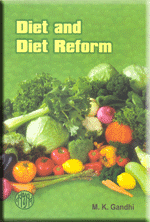
P.O. SEVAGRAM, DIST.WARDHA 442102, MS, INDIA. Phone: 91-7152-284753
FOUNDED BY MAHATMA GANDHI IN 1936
DIET AND DIET REFORM

DIET AND DIET REFORM
Table of Contents
PART-I
- SECTION I: General
- My Faith In Vegetarianism
- The Moral Basis of Vegetarianism
- Diet For Brahmacharya
- Green and Dietetic Ahimsa
- 'Food Faddists'
- Unfired Food Experiment
- Unfired Food
- Unfired Food
- Unfired Food
- National Food
- Minimum Diet
- For Four Rupees A Month
- A Talk to Village Workers
- Minimum Diet
- Plea for More Fruits
- Carrion-eating
- SECTION II : Rice, Wheat and Gur
- SECTION III : Soya Beans and Ground-nuts
- SECTION IV : Green Leaves, etc.
- SECTION V : Milk
- SECTION VI : Ghee and Oil
PART-II
- SECTION I : General
- Precautions Against Ills of The Season (M.D.)
- Dietetic Changes (M.D.)
- Mortification of The Flesh (M.D.)
- Vitamins - I (P. C. Ghosh)
- Vitamins - II (P. C. Ghosh)
- Physiological Basis of Nutrition
- Are you acid? (H. C. Menkel)
- What And How Much To Eat? (H. C. Menkel)
- Question on Diet (H. C. Menkel)
- Improved Diets (A. K.)
- Place of Cereals in Food (I. Amin)
- An Experiment in National Diet (Pyarelal)
- Revealing Figures (A. K.)
- SECTION II : Rice, Wheat and Gur
- The Miracle of Unpolished Rice (M.D.)
- Unpolished v. Polished Rice (Prof. Basu)
- Saving Cereals (D. K. Gupta)
- Useful Suggestion (M. A. Chadray)
- White v. Brown Sugar (M. D.)
- The Havoc of Sugar (M. D.)
- Bad Teeth and Refined Carbohydrates
- Potentialities of Palm Jaggery (Gajanan Naik)
- Nira - A Nutritious Beverage (Gajanan Naik)
- SECTION III : Soya Beans and Ground-nuts
- Warning against Soya Beans (M. D.)
- Soya Beans (M.D.)
- Soya Bean Recipes
- A Soya Bean Book (M. D.)
- The Utility of The Ground-nut (A. K.)
- SECTION IV : Fruit
- The Merit of Amla (A. K.)
- SECTION V : Milks
- Kimmed Milk and Buttermilk (W. R. Aykroyd and S. C. Dasgupta)
- SECTION VI : Ghee And Oil
- Edible Oils (P. C. Ghosh)
- Blindness At A Price (J. C. Kumarappa)
- Nakali Ghee (J. C. Kumarappa)
- SECTION VII : Tea
- Another Rising Menance (J. C. Kumarappa)
- Non-English Words With Their Meanings
About This Book
Written by : M. K. Gandhi
Edited by : Bharatan Kumarappa
First Edition : 5,000 copies, July 1949
ISBN : 81-7229-062-4
Printed and Published by : Jitendra T. Desai
Navajivan Mudranalaya,
Ahemadabad-380014
India
© Navajivan Trust, 1949
Download
Chapter 19: Unpolished Rice
The following is the result of my observations to date.
Whole, unpolished rice is unprocurable in the bazars. It is beautiful to look at and rich and sweet to the taste. Mills can never compete with this unpolished rice. It is husked in a simple manner. Most of the paddy can be husked in a light chakki without difficulty. There are some varieties the husk of which is not separated by grinding. The best way of treating such paddy is to boil it first and then separate the chaff from the grain. This rice, it is said, is most nutritious and, naturally, the cheapest. In the villages, if they husk their own paddy, it must always be cheaper for the peasants than the corresponding mill- husked rice, whether polished or unpolished. The majority of rice found ordinarily in the bazars is always more or less polished, whether hand-husked or mill-husked. Wholly unpolished rice is always hand-husked and is every time cheaper than the mill-husked rice, the variety being the same.
Subject to further research, the observations so far show that it is because of our criminal negligence that rice-eating millions eat deteriorated rice and pay a heavy price into the bargain. Let the village worker test the truth of these observations for himself.
Harijan,
25-1-1935